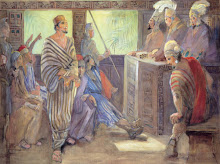Article of Faith 8: "We believe the Bible to be the word of God, as far as it is translated correctly. We also believe the Book of Mormon to be the word of God."
As a student at Brigham Young University I took a class from David Rolf Seely, Professor of Ancient Scripture. The first two days of class were spent discussing what Joseph Smith meant when he wrote this seemingly simple statement of belief. The part of the statement focused on was the conditional statement concerning the Bible. What did Joseph mean when he wrote "as far as it is translated correctly"? More specifically, what did Joseph mean by "translated"?
The average English-speaking Mormon today would probably say that Joseph was referring to the different "versions" of the Bible, and by that they would mean the different English translations, such as the King James Version, the New International Version, the New Revised Standard Version, etc. And they would likely tell you that Joseph was implying that the King James Version is the most correct translation, and that if you use other versions you are getting diluted doctrine.
However, Joseph Smith really only knew one English version, and that was the KJV. There were others available, but most American Christians used the KJV and were not terribly concerned with other versions in the early nineteenth century. So Joseph was probably not really making a reference to one English Bible over another. No, for Joseph, the word "translated" as used in this context likely has to do more with transmission and the different translations associated with the transmission of the Biblical text.
Let me explain. The Gospel of Mark is, according to the majority of New Testament scholars, the earliest written of the four Gospels. Mark apparently got his information from Peter who told Mark (presumptively speaking in Aramaic) about his experiences with Jesus. Here we have one transmission of a text, i.e. the "oral text" of Peter's experiences transmitted into a written text produced by Mark and written in Greek. We also see the first translation of the text from Aramaic to Greek. For the most part I think we trust that that first transmission occurred without much error, perhaps Peter proofread Mark's text, or maybe Mark waited a few years after Peter's death to record his Gospel, but had a good memory and produced a rather reliable text. Mark's written text was then copied by a few Christians and distributed, and copies were made of those copies and distributed further, and so on. Here we have a number of transmissions, all from Greek to Greek in the early Church, though some were likely copied in other languages such as Coptic. All of these first century copies of Mark are missing, and to find a complete manuscript of the Gospel of Mark one needs to look a few centuries into the future. How many transmissions took place between the original and the "received text"? We don't really know. But there are different versions from the ancient world, and text critics have studied the different versions exhaustively looking for variants, of which there are comparatively few. But how much these similar versions may differ from the original can only be surmised. Eventually these texts were translated into the common languages of Europe and distributed by means of a printing press which allowed for very few variations in texts.
But over the centuries things could have been changed, left out, added, etc. to the Biblical Text. And this, at least in part, seems to be what Joseph is referring to when he speaks of the Bible being "translated correctly."
Joseph did make inspired corrections to the King James text of the Bible. Studying these changes allow us to see a more correctly translated version of the Bible, but I think what Joseph would encourage us to do, and in fact our current Church leaders encourage the same thing, is to read by the lamp of the Spirit. Understand that the Bible is indeed the Word of God. It is inspired of God, but there may be things in there that don't sit right with your conscience. And if that is the case you have two basic choices: ignore it considering it to be part of the Bible that is not translated correctly, or deal with it by investigating further, asking questions, praying for inspiration, and coming up with your own answers. I think the latter is much more instructive an edifying.
Thursday, January 10, 2008
Subscribe to:
Post Comments (Atom)

No comments:
Post a Comment